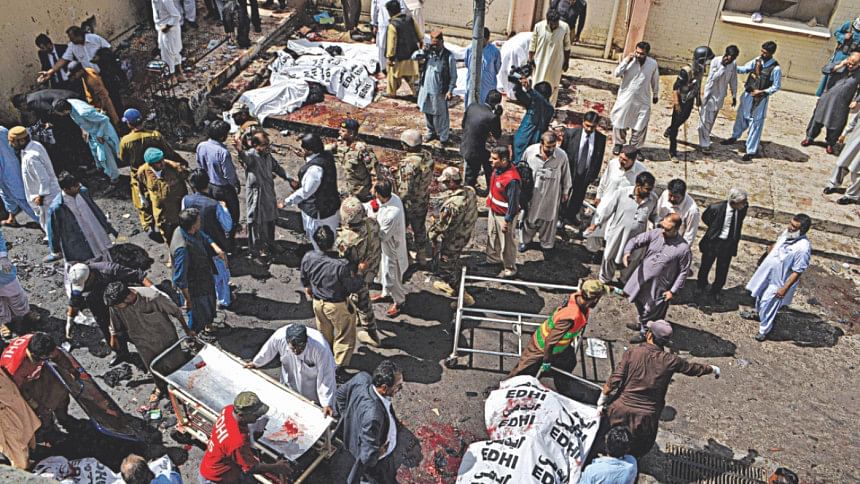Taliban kill 70 in Pak hospital

A Taliban suicide bomb packed with ball bearings tore through a Pakistani hospital yesterday and killed at least 70 people, as witnesses described tearful staff rushing towards the smoking blast site to help the wounded.
The bomber struck a crowd of some 200 people gathered at the Civil Hospital in the Balochistan provincial capital Quetta after the fatal shooting of a senior local lawyer earlier in the day. More than 100 were wounded, officials said.
Video footage showed bodies strewn on the ground, some still smoking, among pools of blood and shattered glass as shocked survivors cried and comforted one another.
Many of the victims were clad in the black suits and ties traditionally worn by Pakistani lawyers.
An AFP journalist was about 20 metres away when the bomb went off.
"There were huge black clouds and dirt," he said.
"I ran back to the place and saw dead bodies scattered everywhere and many injured people crying. There were pools and pools of blood around and pieces of human bodies and flesh."
Nurses and lawyers wept as medics from inside the hospital rushed out to help dozens of injured, he said.
"People were beating their heads, crying and mourning. They were in shock and grief."
Pervez Masi, who was injured by pieces of flying glass, said the blast was so powerful that "we didn't know what had happened".
"So many friends were martyred," he said. "Whoever is doing this is not human, he is a beast and has no humanity."
Police confirmed the attack was a suicide blast.
"The bomber had strapped some eight kilograms (18 pounds) of explosives packed with ball bearings and shrapnel on his body," bomb disposal unit chief Abdul Razzaq told AFP.
A faction of the Pakistani Taliban, Jamaat-ul-Ahrar, claimed responsibility for the attack in an email to journalists.
Jamaat-ul-Ahrar has also said it was behind the deadliest attack in Pakistan so far this year, a bombing in a crowded Lahore park that killed 75 people on Easter Sunday.
A spokesman vowed more attacks "until the imposition of an Islamic system in Pakistan".
"The death toll has risen to 70 and there are 112 injured," the head of the provincial health department, Dr Masood Nausherwani, told reporters.
Officials said mobile phone jammers had been activated around hospitals in the area -- a regular precaution after an attack -- making it hard to contact officers on the ground to get updated information.
CROWD MOURNING LAWYER'S DEATH
The crowd, mainly lawyers and journalists, had gone to the hospital after the death of the president of the Balochistan Bar Association in a shooting earlier yesterday, said provincial home secretary Akbar Harifal.
Bilal Anwar Kasi was targeted by two unidentified gunmen as he left his home for work.
Pakistan is grimly accustomed to atrocities after a nearly decade-long insurgency. But security had markedly improved in 2015, when the death toll from militant attacks fell to its lowest since 2007, when the TTP was formed.
Balochistan, which borders Iran and Afghanistan, has major oil and gas resources but is afflicted by Islamist militancy, sectarian violence between Sunni and Shia Muslims and a separatist insurgency.
Prime Minister Nawaz Sharif condemned the attack and ordered authorities to tighten security. He and the head of Pakistan's powerful military visited Quetta to express their condolences.
Facebook activated its safety check for Quetta in the wake of the attack. Pakistani hospitals have been targeted by militants before.
In 2010 a bomb killed 13 people outside the casualty department of a hospital in Karachi, where victims of an earlier attack were being treated as anxious relatives gathered.

 For all latest news, follow The Daily Star's Google News channel.
For all latest news, follow The Daily Star's Google News channel. 



Comments